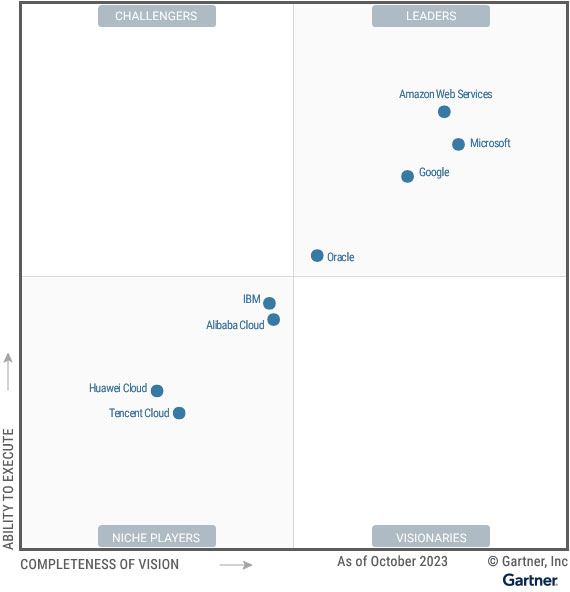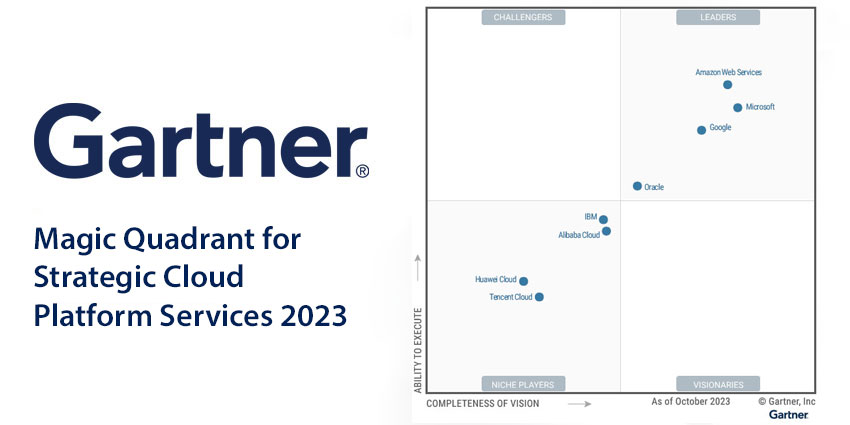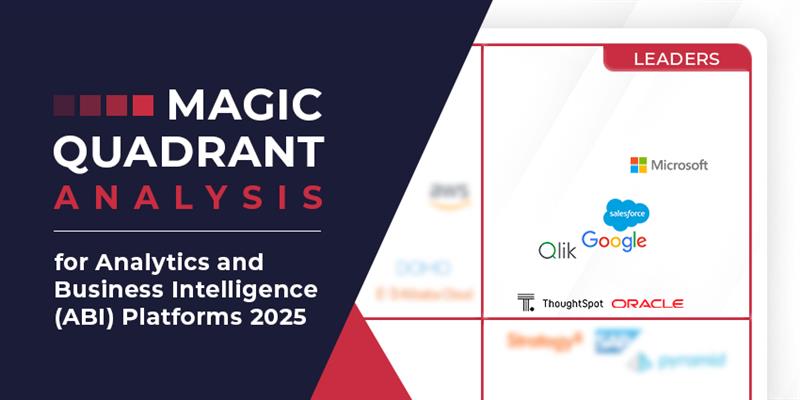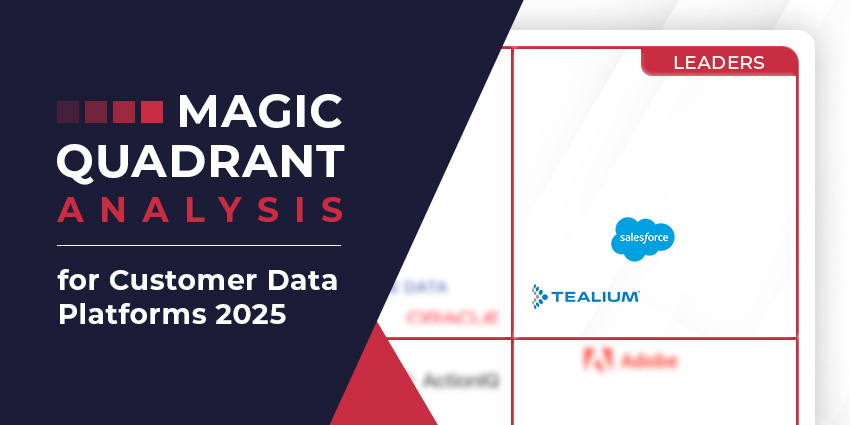As businesses experiment more with AI, integrate SaaS platforms, and strive to lower maintenance work, the public cloud has become many organizations’ infrastructure of choice.
Yet, how businesses interact with the public cloud is changing. As Gartner reports, more now ask: what can we do with this cloud provider? Instead of: what can this cloud provider do?
This Gartner Magic Quadrant aspires to help businesses ready to embrace this mentality shift and compare providers on critical buying criteria.
To do so, the analyst dissected seven prominent providers of strategic cloud platform services before isolating four market leaders.
The Definition of Strategic Cloud Platform Services
Strategic cloud platform services is an umbrella term for the infrastructure, platform, and transformation services public cloud providers offer. Examples for each include:
- Computing, network, and storage services (infrastructure services).
- Managed application and data services (platform services).
- Resources that support customer adoption of cloud-oriented IT delivery models (transformation services).
As per Gartner, businesses leverage these services when embarking upon four types of cloud journey: tech replacement, cloud-native adoption, cloud innovation, and business transformation.
Each journey requires a special blend of the services above. Yet, few cloud platform services will possess the comprehensive capabilities required to meet diverse enterprise needs, guide a business’s direction, and offer essential support services along the way.
Thankfully, the Magic Quadrant helps businesses select the best-fit provider by giving insights into seven such vendors’ perceived strengths and cautions.
To determine all this, Gartner created a comprehensive set of criteria, including essential features, additional services, and global support programs for transformation efforts.
After, the research firm created the following matrix, with each provider split into four groups: Leaders, Challengers, Visionaries, and Niche Players.

Gartner Magic Quadrant Leaders
Leaders in the Gartner Magic Quadrant can boast an ambitious roadmap, significant market share, and many positive customer references. They may not excel in all areas or be the best providers for specific needs, but their services are often suitable for strategic adoption. This year’s Leaders are:
- Amazon Web Services
- Microsoft
- Oracle
Amazon Web Services (AWS)
AWS excels in the depth of its cloud infrastructure and platform services, which are “often more mature” than its market rivals. As Gartner notes, its core IaaS and PaaS services typically help establish the standards and price points for the space. The analyst also commends AWS for its large, capable partner ecosystem and hardware design innovations. Exemplifying the latter, AWS was the first provider to design its own Advanced-RISC-Machine- (ARM-) based chipsets and deploy performance security and acceleration through hardware offload via its Nitro System.
Microsoft
Microsoft Azure is “strong in all use cases” – according to Gartner. The analyst continues by highlighting how it’s also well-suited to hybrid- and multi-cloud transformations, with its Azure Arc offering a proficient bridge to connect cloud and legacy tech. Moreover, Gartner describes the developer services offered on Azure as “best of breed” and applauds the provider’s many iron-clad strategic partnerships. OpenAI is perhaps the most prominent example. Yet, its collaboration with IT leaders (e.g., Dell, Oracle, and SAP) alongside vertical leaders (e.g., Epic and AT&T) impresses.
The Google Cloud Platform tackles “nearly all” IaaS and PaaS use cases. The provider infuses each with AI. Sometimes, that is via third-party integrations available on the Vertex AI platform. However, Google also leverages its “leading” AI models and integrates them at a deep level across IaaS and PaaS services. Further plusses include its design elegance and environmental sustainability. The former – as per cited cloud engineers – makes Google’s platform APIs “more consistent” and “easier to learn.” Such capabilities helped Google increase its market share by over 40 percent in 2022.
Oracle
When it comes to distributed and sovereign cloud computing, Oracle is “outmaneuvering” the market, according to Gartner. Indeed, it provides various deployment options, from private regions in customer data centers to locally partner-operated regions. Such options are often ideal for brands that abide by strict data privacy regulations. Other strengths of the Oracle Cloud Infrastructure (OCI) include its multi-cloud integration (inc. its Azure interoperability) and pace of innovation. Its velocity of database management system and data integration feature releases exemplify the latter.
Gartner Magic Quadrant Challengers
Challengers in the Gartner Magic Quadrant meet many current market needs, offering a “good” service across specific use cases. Moreover, they can demonstrate a history of successful implementations. Yet, they sometimes trail in their “scope of ambition” or speed of adaptation to market changes. This year’s Challengers are:
- There are no Challengers in this year’s Magic Quadrant.
Gartner Magic Quadrant Visionaries
Visionaries in the Gartner Magic Quadrant pair an ambitious roadmap with a record of leveraging promising, disruptive technologies. However, they trail leaders in the broad availability of their services, range of use cases, and/or geographic footprint. This year’s Visionaries are:
- There are no Visionaries in this year’s Magic Quadrant.
Gartner Magic Quadrant Niche Players
Niche Players in the Gartner Magic Quadrant often fit the bill for specific use cases deployed within particular regions. But, Gartner suggests viewing them as “specialist” vendors. After all, they often lack depth in their current use cases, roadmap, and geographic scope. This year’s Niche Players are:
- IBM
- Alibaba Cloud
- Tencent Cloud
- Huawei Cloud
IBM
Despite its Niche Player status, IBM is well-regarded for its highly-regulated market focus, with financial services a fledgling example. There, IBM offers preconfigured control sets that support an automated security and compliance “posture” for sensitive workloads. Elsewhere, Gartner commends IBM for its multi-cloud container management and support for legacy and non-x86 workloads. Meanwhile, it cautions towards IBM’s resiliency architecture but caveats that by highlighting how IBM has achieved a notable reduction in disruptions in 2023.
Alibaba Cloud
Alibaba Cloud leads the Chinese space in both its market share and thought leadership. That has international significance and has fueled promising growth in surrounding markets. Gartner doubles down on this before pinpointing Alibaba’s hybrid infrastructure, engineering capability, and digital ecosystem enablement as strengths. However, the analyst finds inconsistencies in its global support offerings and spotlights how its data center infrastructure is inferior outside of China. Lastly, strategic uncertainty blighted Alibaba’s 2023, culminating with the CEO’s resignation in September.
Tencent Cloud
Tencent Cloud aspires to appeal to businesses that require a scale-out application architecture, high-performance networking, and rich media processing. In building towards this, Tencent has supported some of the world’s biggest gaming and social media deployments. Gartner recognizes this and commends the provider’s pricing incentives and high-touch support. However, despite the latter, the analyst cites fluctuations in Tencent Cloud’s market execution. It also cautions towards a limited partner ecosystem and modest market share, particularly outside China.
Huawei Cloud
Huawei Cloud offers a divergent global market strategy, targeting underserved international cloud markets and leveraging its telecoms base to establish cloud relationships. As a result, the provider has experienced growth in Latin America, the Middle East, and Southeast Asia. Gartner rubberstamps this strategy as a core strength, alongside Huawei’s high customer satisfaction across parts of its customer experience and large enterprise relationships. Nevertheless, the brand remains hampered by international sanctions – alongside limited product clarity and consultancy partnerships.
Deep dive into some of our other Magic Quadrant report rundowns below:







